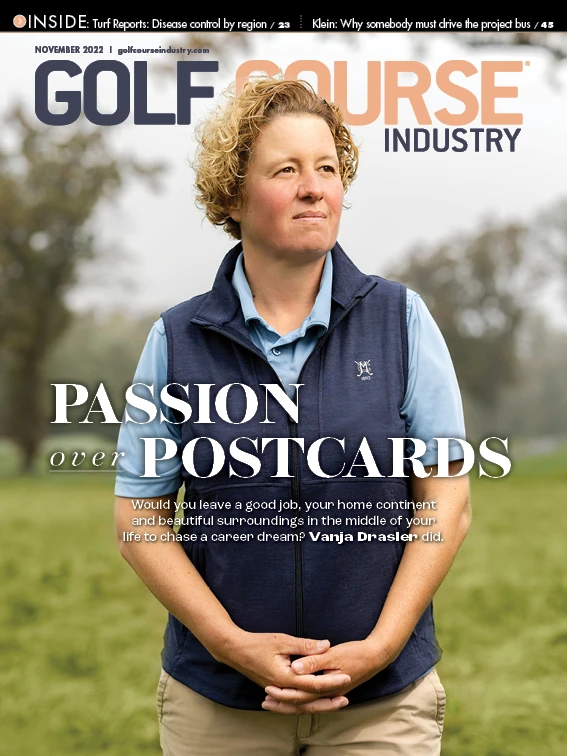
I’m a two-time graduate of Virginia Tech University and I love my VT Hokies. I know things in Blacksburg have been bleak of late and especially this year. But whether or not you follow college football, you may have heard of VT’s lunch pail, the symbol of the defense previously led by former defensive coordinator Bud Foster.
The lunch pail was symbolic of the blue-collar work ethic and was a tremendous source of pride for those selected to carry the pail each week. The word WIN was painted on the pail, and you may be surprised to learn it meant more than the obvious. WIN was an acronym for What’s Important Now, and if you listened to episode 36 of the Beyond the Page podcast last month, you heard me talk about it.
I was on the podcast with Matt LaWell to discuss my two previous columns and during our conversation about October’s column, Matt inquired why I think greenkeepers in the United Kingdom often achieve as much as superintendents in the United States with considerably smaller teams. If you didn’t listen to the podcast, I will patiently wait for you to do so now.
Welcome back! Where was I? Oh, yeah, we were talking about how greenkeepers in the United States strive so hard to meet or exceed our members’ expectations as well as our own, and sometimes we allow the noise of complaints to distract us from what’s important now.
I recall seeing a photo of a novelty T-shirt once that read, “Golf Course Superintendent: I solve problems you don’t even know you have by means which you don’t understand.” Clever, yes. But the more I think about it, the more this contributes to rising expectations.
We are definitely problem-solvers. It is our job to recognize a situation that might be developing and quickly react to correct the issue — hopefully before anyone notices.
If we are constantly working hard to recognize and eliminate issues before they manifest into larger problems, our employers are quite possibly not aware of the exact lengths we go through to maintain the illusion that everything is operating smoothly. In other words, are we creating the perception we can easily handle more and continue to produce above and beyond when the reality is we might be struggling just to make ends meet? Remain calm, all is well.
Don’t get me wrong. I was taught early in my career the parable of the clover and how sometimes innocently pointing out minuscule thorns in our side can manifest into major headaches in this business. You don’t know the parable of the clover, you say?
Here’s the condensed version: Jim is the superintendent, and he is standing outside the clubhouse looking across the course when he’s approached by Mrs. Smith. She says hello and compliments Jim and his staff on the overall condition and presentation of the course. Jim says, “thank you,” but points out he’s unhappy about the amount of clover present in the rough. Mrs. Smith asks him to explain, and Jim shows her the plants and briefly educates her on the weed and his recent struggle to eradicate it.
Later that evening, when Mrs. Smith returns home, her husband asks about her golf game. She tells her husband about meeting Jim and his issues with the clover. The next day, Mr. Smith plays in his regular foursome and proceeds to point out to everyone the clover growing in the rough and how Jim struggles to manage it. One of the regulars in Mr. Smith’s group is on the green committee and he phones the green chair after the round to inform him of this clover epidemic. The next thing you know, Jim gets called into an emergency meeting of the board to explain the situation.
I understand that might seem a bit extreme in today’s world of agronomy and golf course maintenance practices, but I do believe it largely explains the slogan on the T-shirt. Where do we go from here? How do we strike the balance between keeping our course owners and/or members informed without bothering them with trivial nonsense?
With the 2022 growing season reaching its conclusion, hopefully you and your team can use this time to reflect on the triumphs and tragedies of the past spring, summer and early fall. Then meet with your owners and/or committees to identify what will be the WINs for 2023.
The answer lies in communication. It’s about level-headed sharing in these meetings and everyone involved understanding where the hours and resources need to go in order to WIN.
Until then, don’t forget to spray the clover.

Explore the November 2022 Issue
Check out more from this issue and find your next story to read.
Latest from Golf Course Industry
- From the publisher’s pen: Conscientious of a bigger role
- Bernhard and Company partners with Laguna Golf Phuket
- Terre Blanche showcases environmental stewardship
- VIDEO: Introducing our December issue
- Bernhard and Company introduces Soil Scout
- Nu-Pipe donates to GCSAA Foundation’s Centennial Campaign
- GCSAA enhances golf course BMP tool
- Melrose leadership programs sending 18 to 2026 GCSAA Conference and Trade Show





